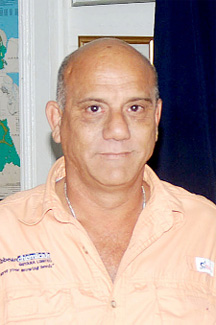The health of farmers and consumers and the viability of local agricultural enterprises are under threat from fake chemicals which are being illegally imported and sold to farmers across the country, according to Managing Director of Caribbean Chemicals Guyana Ltd Victor Pires.
Pires, whose company provides the country’s agricultural sector with both treatment for plant and soil application and scientific farming advice told Stabroek Business that farmers in the various sub-sectors in the industry are duped by cheaper prices for products which may be manufactured under the same brand name, but which may be no more than a less expensive, ineffective and perhaps even highly toxic alternative. Pires does not rule out the possibility that some of the fake chemicals may already have contributed to serious illnesses, perhaps even deaths in the farming community.

Importers of fake chemicals into Guyana, Pires says, target mostly the rice sector though some fake products are sold to farmers in vegetable cultivation. The supply of fake products, he says, ebbs and flows and this year the rice sector appears once again to have been targeted by importers of fake chemicals. The Caribbean Chemicals Managing Director explains that some of the chemicals which have already been sold to rice farmers in other parts of the country have been detected in Essequibo.
Pires told Stabroek Business that the “millions of dollars” in fake chemicals being imported into Guyana and sold to the farming community at considerably lower prices than those available through reputable local distributors may even suggest that the practice is in fact a form of money-laundering.
According to Pires while the Customs and Trade Administration has become more proficient at suppressing the importation of such chemicals through the country’s legal ports of entry, the fight against the practice is undermined by relatively uninhibited importation across the country’s borders. Pires says that the illegal imports are entering Guyana through all of its “largely unprotected borders” but that the greatest danger may lie at the Guyana/Suriname border, since, he explained, that country has few if any regulations associated with the importation of agricultural chemicals. Guyana/Suriname illegal entry points are known to be locations for the smuggling of high volumes of consumer goods and other items into Guyana.
The illegal importation of fake chemicals into Guyana have reportedly become an organized practice and Pires told Stabroek Business that Caribbean Chemicals and another local distributor had intervened some time ago to stop the illegal importation of fake agricultural chemicals by illegal operators who had succeeded in having the packages display the trading names of the local distributors. “He explained that it was simply a matter of getting hold of the labels of the local companies and having them replicated overseas and affixed to the packages containing the fake products. Pires told Stabroek Business that Caribbean Chemicals and other local distributors have held meetings to discuss the problem and to determine how best to protect their companies’ reputations.
The counterfeiting of chemicals used in the agricultural sector is a global, financially lucrative operation that poses growing problems for the plant science industry. The practice brings to bear a range of negative effects for the industry, farmers, consumers and the environment including risk to human health, risks that buyers of export crops will ban imports, discouragement of entrepreneurs from investment in legitimate farming chemicals and loss of sales for honest companies. The cumulative effect of such counterfeiting can be the elimination of the incentive for plant science companies and distributors of legitimate products to continue to invest time and money in developing and marketing new technologies that can improve the performance of the agricultural sector.









